Russia Reform Monitor: No. 2006
Russian Islamists on the march... and in Ukraine?;
The BBC escalates the battle of ideas with Russia
Russian Islamists on the march... and in Ukraine?;
The BBC escalates the battle of ideas with Russia
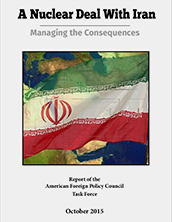
The announcement of a nuclear deal in July 2015 brought to a close nearly two years of intensive negotiations between Iran and the P5+1 powers (the U.S., UK, France, Russia, China and Germany).
Beijing centralizing, consolidating environmental oversight;
Chinese group to build high-speed rail connecting Las Vegas, LA
"I want Russia to be successful," President Barack Obama told reporters on Friday after chastising Vladimir Putin for his stepped-up militarism in Syria. "This is not a contest between the United States and Russia. It is in our interest for Russia to be a responsible, effective actor on the international stage that can share burdens with us, along with China, along with Europe, along with Japan, along with other countries - because the problems we have are big."
Al-Shabaab makes a comeback;
Canada tackles counterradicalization...;
...as Morocco takes on training French imams;
Russia's jihadi legion
The Kremlin as "
lender of last resort"
Banning Russians from Ukrainian media
PLA miffed over troop cuts?;
China and Vietnam target drug trafficking
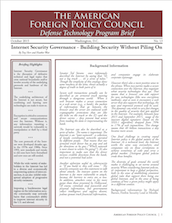
Internet Security Governance covers the policy challenges that arise from building and governing security in the Internet’s architecture and key protocols. It is not a description of security for computers and networks (Information Assurance), how to manage the negotiated structure and key functions of the Internet (Internet Governance), or the pursuit of criminal groups and other threat actors (Cyber Crime). Internet Security Governance is the discussion of defensively oriented technical and legal topics that cross national boundaries and/or involve security of the underlying protocols and hardware which make up the Internet...
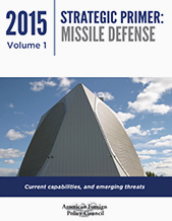
The goal of the new Strategic Primer initiative is to provide a concise, comprehensive overview of specific defense technology issues presented in a clear, direct, and graphical manner that serves as an accessible reference to policymakers. Volume 1 of the series focuses on Missile Defense.
China forced to defend yuan amid economic turmoil;
Europe concerned China’
s “
reform momentum has been lost”
Timing is everything. On September 20, Pope Frances met with former Cuban leader Fidel Castro in Havana. Three days later, Cuban President Raúl Castro was photographed in a three-way handshake with Colombian President Juan Manuel Santos and Rodrigo Londoño, known as Timochenko, the commander of the Revolutionary Armed Forces of Colombia (FARC). Castro’s hands were clasped over theirs as if he were blessing a marital union. And, in a way, he was. The Colombian government and FARC had just announced that, after over two years of negotiations, they had come to an agreement on transitional justice, the last point on their four-point peace talks agenda.
Exploring East coast site options;
Growing pains for Mideast missile shield;
Chinese missile advances on display;
Israeli missile defense at sea;
The next iteration of the ABL
Iran-Bangladesh Foreign Ministers meet;
Pakistan's first use of armed drone;
'Pakistan has second nuclear strike capability';
Afghan Taliban says leadership dispute is resolved;
Sri Lanka military to get out of business
From Russia, with arms;
Kremlin brass on the Ukrainian battlefield
"We need to get to the negotiation," Secretary of State John Kerry said of efforts to convince Syria's Bashar Assad to step down. "That's what we're looking for, and we hope Russia and Iran, [and] other countries with influence, will help to bring that about, because that's what's preventing this crisis from ending."
Egyptian military kills tourists in militant territory;
Libyan rival governments reach "
consensus"
Iraq tells Turkey to coordinate attacks on PKK;
Al Qaeda leader issues statements on ISIS;
South Sudan denies attacking rebels
Kidnapping, a new method of Russian "
hybrid warfare"
Playing politics with language in Crimea
India-Australia first naval exercise;
Militants get ID cards in Pakistan for $100;
Pakistan allows Taliban to meet, choose leader;
ISIS threatens to kill Maldives president;
Pakistan says "
almost all Uighur militants eliminated"
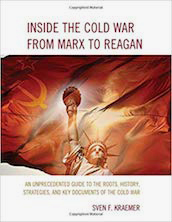
A long-time U.S. policy insider’s scholarly and encyclopedic history with unprecedented analysis of the official documents of the Cold War explores its Marxist-Leninist totalitarian roots, faltering pre-Reagan U.S. strategies of Containment, MAD, and Détente, and the Reagan Revolution.
JERUSALEM - It's all over but the shouting. Over the past week, the political tug-of-war over President Obama's controversial nuclear deal with Iran has tilted decisively in favor of the White House.
Despite widespread disapproval among the American electorate, and last-ditch attempts by some in Congress to delay its passage, it increasingly appears that the agreement, formally known as the Joint Comprehensive Plan of Action, or JCPOA, will soon be a done deal.
Publishing, Russian style;
Arms to Egypt... and the Arctic
Saudi-coalition deploys 10,000 more soldiers;
Egypt launches operation against ISSI in Sinai;
Russia builds military base in Syria;
Greece seizes shipment of arms bound for Libya;
Turkish ground troops in Iraq
In mid-August, during the latest wave of violence in the long-running Ukraine crisis, Russian President Vladimir Putin and a coterie of other Kremlin officials trekked out to Crimea. The high-profile visit was intended as a public sign of the Kremlin's enduring commitment to its newest territorial holding. But behind the headlines, the story is far less reassuring: Russia is realizing that its Crimean annexation has become an increasingly costly venture in both political and economic terms.
Italian energy group finds oil off Egypt coast;
ISIS cracks down in Iraq town after protest;
ISIS bombs temple in Palmyra;
Houthis raid homes of opponents in capital;
Yemen factions to battle over central province
Russia's ISIS-first strategy in Syria;
Another social media site targeted
Xi's reforms encountering “
unimaginably fierce resistance”
Spotlight on China’
s artificial islands
Chinese hackers target Tibetans in India;
U.S. warns China on forced repatriations
Life in an ISIS economy;
A free-for-all in Egypt;
Cairo's new counterterrorism ally;
Meet the Taliban's new leader;
Boko Haram expands its ambit
The Navy task force that will run NATO missile defense;
Iran deal ignites regional arms race;
Iron dome for export;
New Russian military advances;
Pentagon looks "
left of launch"
Patriots stuck in Turkey
When the proposed Joint Comprehensive Plan of Action between Iran and the P5+1 powers was announced in July, it was sold as a tough deal with robust verification that blocked Iran's pathways to nuclear weapons and would lead to peace and stability in the region. However, it soon became apparent that the deal is much weaker than its proponents first suggested. With a vote on Capitol Hill approaching, members of Congress who rushed early to support the proposed deal need to take another look at their positions. The deal as announced weeks ago is already falling apart.
Russia's expanding Arctic claim;
Putin popular at home, reviled abroad
Litvinenko killing "
personally ordered"
by Putin, court hears;
Russian citizens versus the Internet
Despite economic troubles, Russian defense spending soars;
Savchenko in the dock
Ukraine is at war. Since the spring of 2014, Vladimir Putin’s Russia has waged a concerted campaign of aggression against its smaller western neighbor. Moscow’s “hybrid warfare” in support of separatist enclaves in Ukraine’s Donbass region has included the insertion of military forces to augment pro-Russian insurgents, large-scale deliveries of military matériel to these fighters, and the widespread use of propaganda. The Kremlin’s efforts have met with political and economic pressure from the West, in the form of multilateral sanctions imposed by the Obama administration and the European Union. However, the strongly negative effects of this pressure on the Russian economy have not caused the Kremlin to change course in any meaningful way.
Russia doubles down on the Kurils;
The Crimean millstone
In late July, the US Senate Committee on Homeland Security and Governmental Affairs assembled a number of top experts to discuss a critical threat to the homeland: electromagnetic pulse (EMP).
Crackdown on illegal mining of rare earth materials;
Thailand repatriates Uighurs to China
In July, President Barack Obama said that he hoped the proposed nuclear deal with Iran could lead to continued conversations with the Islamic regime "that incentivize them to behave differently in the region, to be less aggressive, less hostile, more cooperative," and to generally behave in the way nations in the international community are expected to behave. The most optimistic proponents of the deal believe that the process could open the door to more comprehensive detente, empower Iranian moderates and lead to a gradual, peaceful form of regime change - a change of heart, if not of leadership.
What's next after the Obama administration's opening to Cuba? Why, an embassy in Tehran, of course.
On Aug. 14, in a ceremony replete with pomp and circumstance, Secretary of State John Kerry presided over the formal re-opening of the US Embassy in Havana, Cuba. The occasion marked the culmination of nearly two years of quiet diplomacy between the White House and the Castro regime.
Xi promotes former acolytes;
Opposition to textbook changes in Taiwan
Target: Britain;
A new leader for Boko Haram;
Taking stock of the anti-ISIS effort;
How web 2.0 aids the counterterrorism fight
A central plank of the Obama administration's case for the nuclear deal just concluded by the P5+1 powers is that the agreement closes off "all pathways" by which the Iranian regime could acquire a nuclear capability, at least for the coming decade.
Drilling a Baltic invasion;
How Russia exploits North Korean slave labor
Protests follow death of imprisoned Tibetan monk;
Mitsubishi apologizes to China for World War II forced labor
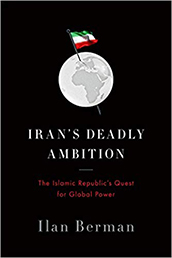
Are we on the cusp of détente with Iran? Conventional wisdom certainly seems to believe so.
Not all that long ago, it seemed as if the United States could learn a thing or two from Europe when it came to economic pressure on Iran. Today, a great deal has changed.
Even as the fledgling Obama administration stuck doggedly to its "engagement" policy toward Tehran, European capitals were rapidly heading in the opposite direction. In November 2009, in a move that caused nothing short of a political earthquake on the Old Continent, a majority of the Dutch parliament formally voted to place Iran's clerical army, the Islamic Revolutionary Guard Corps (IRGC), on the European Union's terror list.
PLAN eyeing overseas “
strategic support points”
Journalism in Hong Kong enters “
darkest era”
Turkey takes off gloves in battle against ISIS;
Iraqi forces attack Islamic state base in Ramadi;
Iran accuses Bahrain of stoking Gulf tensions;
Fighting continues in Yemen as ceasefire quickly unravels;
Kyrgyz leader says U.S. 'sought chaos' by decorating dissident
Iranian air defense improvements?;
Russia expands electronic warfare capability;
Defending Israeli airliners;
Russia incorporates blimp-based missile defense radar;
Turkey's indigenous defenses mature;
North Korea improves missiile launch capabilities
Russia seizes the Iran opportunity;
How the Kremlin sees the world